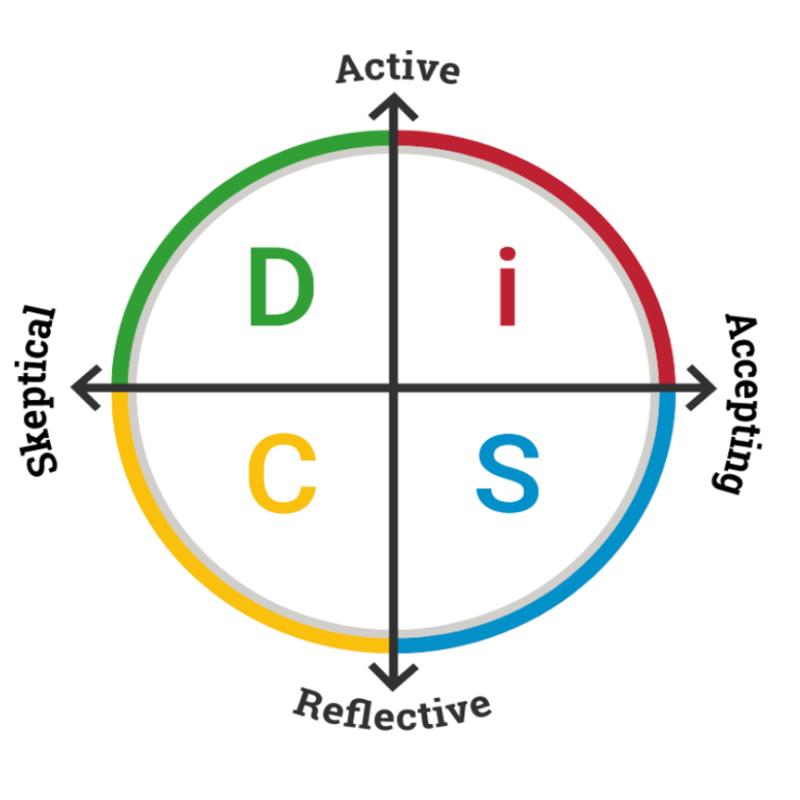Understanding DiSC I Personality
DiSC, which stands for Dominance, influence, Steadiness, and Conscientiousness, is a behavioural model and personality test that helps individuals understand different personality types and improve team dynamics.
In this blog, we will be focusing on the DiSC I personality type, exploring its definition, key characteristics, strengths, challenges, and practical applications in team settings. We will also compare DiSC I personality type with other DiSC types, delve into its subtypes, and discuss what makes it stand out. By the end of this blog, you will have a comprehensive understanding of the DiSC I personality type and how it can positively impact workplace dynamics.
- Understanding DiSC I Personality
- Understanding DiSC I Personality: An Overview
- The Contribution of DiSC I Personality Type in a Team
- Comparing DiSC I Personality with Other DiSC Types
- The Subtypes of DiSC I Personality
- What Makes DiSC I Personality Stand Out?
- Practical Applications of Understanding DiSC I Personality
- The Impact of DiSC I Personality on Leadership Styles
- Are You a DiSC I Personality Type? Discovering Your DiSC Personality Style
- Help Your Business Run Better
- Frequently Asked Questions
- How does Understanding DiSC I Personality Enhance Workplace Dynamics?
Understanding DiSC I Personality: An Overview
The DiSC model of personalities categorizes individuals into different four DiSC styles based on their behavioural traits. The DiSC I style which represents Influence, is one of the main behavioural styles identified by this model. Individuals with the DiSC I personality profile possess traits that emphasize high standards, conscientiousness, and a focus on detail and accuracy.
Definition of DiSC I Personality Type
The DiSC I personality type is characterized by individuals who prioritize quality, precision, and adherence to standards in their work. They have high standards and attention to detail, often striving for excellence in everything they do. DiSC I personality styles are analytical, systematic, and focused on accuracy. They value precision, conscientiousness, and high performance standards.
Key Characteristics of DiSC I Personality Type
DiSC I styles are known for their high standards and attention to detail. The I styles tend to excel in roles that require accuracy, conscientiousness, and adherence to standards. These individuals are organized, diligent, and take great pride in their work. They have a strong sense of responsibility and strive for precision, accuracy, and high performance standards.
The Contribution of DiSC I Personality Type in a Team
The DiSC I style brings unique strengths and traits to team dynamics, making valuable contributions to team performance and success. In this section, we will explore the strengths of DiSC I personality styles, as well as the challenges they may face in team settings, and strategies for leveraging their strengths effectively. DiSC is not designed for pre-employment screening. It’s a personality assessment designed to facilitate teamwork and communication.

Strengths of DiSC I Personality in Team Dynamics
DiSC I styles bring attention to detail, high standards, and precision to team projects. Their analytical skills, organization, and focus on quality contribute to team performance. They are reliable, disciplined, and work diligently to achieve high performance standards. DiSC I styles provide valuable feedback, constructive criticism, and quality control in team settings, ensuring that work meets high standards.
Challenges of DiSC I Personality in Team Dynamics
While the DiSC I personality type has many strengths, it also presents some challenges in team dynamics. DiSC I personality types may have high standards that can sometimes lead to perfectionism, causing delays or conflicts in team projects. They may focus too much on details, potentially missing the bigger picture or delaying progress.
DiSC I personality types may prioritize accuracy and standards over team collaboration, potentially hindering teamwork and communication. They may also struggle with delegating tasks, wanting to ensure everything is done to their high standards.
Strategies for Leveraging DiSC I Personality Strengths in a Team
To leverage the strengths of DiSC I personality styles in a team, it is important to provide opportunities for them to utilize their high standards and attention to detail in team projects. Encouraging open communication and feedback allows them to contribute their constructive criticism and quality control. Supporting team members with DiSC I personality type in finding a balance between attention to detail and the overall goals of the team is crucial. Recognizing and appreciating their contributions in upholding standards, ensuring accuracy, and promoting quality work fosters an environment that aligns with their strengths.
Comparing DiSC I Personality with Other DiSC Types
In this section, we will compare the I styles with other DiSC styles, namely, DiSC D, DiSC S, and DiSC C personality styles, to understand their similarities and differences. Each type brings different traits and strengths to team dynamics, making them valuable assets in different ways.

DiSC I vs DiSC D Personality Type
DiSC I personality types prioritize high standards, attention to detail, and accuracy, while DiSC D personality types prioritize dominance, assertiveness, and results. Individuals with DiSC I personality type excel in roles that require conscientiousness, organization, and analytical skills, while DiSC D personality types excel in leadership, decision-making, and driving outcomes.
DiSC I vs DiSC S Personality Type
DiSC I personality types prioritize high standards, attention to detail, and accuracy, while DiSC S personality types prioritize empathy, teamwork, and building relationships. According to the Extended DISC validation study (2019), type S (steadiness) is the most prominent style worldwide of all DiSC types, with approximately 32% of the worldwide population tending to have a steady personality type.
Individuals with DiSC I personality type excel in roles that require conscientiousness, organization, and analytical skills, while DiSC S personality types excel in collaboration, support, and creating harmonious work environments. People with type S personalities are oriented towards other individuals, which aligns with their focus on empathy and building relationships.
DiSC I vs DiSC C Personality Type
DiSC I personality type focuses on influence and dominance, while DiSC C personality type emphasizes conscientiousness and empathy. DiSC I personalities are great listeners, while DiSC C personalities excel in attention to detail and high standards.
Understanding the differences between DiSC I and DiSC C personality types can enhance team building and performance of teams. DiSC I personalities thrive in situations that require persuasion and teamwork, while DiSC C personalities prefer work environments with structure and predictability.
Also read What DiSC Personalities Work Best Together?
The Subtypes of DiSC I Personality
DiSC I personality type can be further divided into subtypes, namely, ID: Influence and Dominance, and IS: Influence and Steadiness. Understanding these subtypes provides a deeper understanding of the different traits within the DiSC I personality type.
ID/DI: Influence and Dominance
ID personalities or DI style, which combine influence and dominance, are charismatic leaders who take charge and drive results. They are persuasive, confident, and comfortable in high-pressure situations. ID personalities work well at motivating others, taking risks, and making quick decisions.
Recognizing people with an ID DiSC style can help in assigning them roles that allow them to utilize their natural strengths. While sometimes they may come across as assertive or dominating, their actions are driven by a desire for success and achievement.
IS: Influence and Steadiness
IS personalities, which combine influence and steadiness, are people-oriented team members who value collaboration and harmony. They are sociable, supportive, and great listeners. IS personalities thrive in environments that allow teamwork, empathy, and building strong relationships.
Recognizing people with IS personality traits can help foster a positive work environment that encourages cooperation, teamwork, and minimizes the fear of rejection. While IS personalities may sometimes avoid conflict, they are motivated by the desire to create harmonious workspaces.
What Makes DiSC I Personality Stand Out?
The DiSC I personality type has unique aspects that make it stand out among other types. In this section, we will explore these unique traits, as well as common misconceptions associated with the DiSC I personality type.
Unique Aspects of DiSC I Personality
DiSC I personalities have a natural aptitude for building relationships, making them great team players and leaders. They excel at using their charisma, enthusiasm, and persuasive skills to influence others.
DiSC I personalities thrive in situations that require creativity, innovation, and thinking outside of the box. They are comfortable with taking risks, embracing change, and adapting to different situations. DiSC I personality types often have a high degree of empathy, allowing them to understand and connect with people on a deeper level.
Common Misconceptions about DiSC I Personality
There are some common misconceptions about DiSC I personalities that need to be addressed. One of these misconceptions is that DiSC I personalities are always extroverted, when in reality, they can possess introverted traits as well. Another misconception is that DiSC I personalities are overly dominant, when in fact, they can be great team players who value collaboration.
DiSC I personalities are sometimes seen as attention-seekers, but their desire for recognition often stems from their passion for achieving success. It is important to avoid labeling DiSC I personality types as shallow or superficial, as they often have a deeper understanding of people and situations. Recognizing and dispelling these misconceptions can lead to better teamwork, communication, and appreciation of different personality styles.
Practical Applications of Understanding DiSC I Personality
Understanding the DiSC I personality type has practical applications in various aspects of work, including communication, motivation, and leadership styles. In this section, we will explore how to communicate effectively with DiSC I personality types, how to motivate them, and the impact of their leadership styles.
How to Communicate Effectively with DiSC I Personality Type
When communicating with DiSC I personality types, it is important to be enthusiastic, engaging, and provide opportunities for them to express themselves. Active listening, empathy, and acknowledging their ideas can foster a positive and productive communication environment. Avoid overwhelming DiSC I personalities with excessive details, and instead, focus on delivering key points in an exciting and concise manner. Providing constructive feedback in a positive and supportive way can help DiSC I personality types grow and develop professionally. Flexibility in communication styles, such as using various mediums like face-to-face, email, or social media, can accommodate different preferences of DiSC I personality types.
How to Motivate DiSC I Personality Type
Motivating DiSC I personality types involves recognizing and appreciating their achievements, as well as providing opportunities for them to showcase their skills. Offering challenging tasks, creative projects, or leadership roles can tap into the natural drive of DiSC I personality types. Celebrating successes, providing feedback, and acknowledging their contributions in team environments can boost their motivation and confidence.
DiSC I personality types thrive on recognition, so public praise, awards, or incentives can be effective motivational tools. Creating a work environment that encourages autonomy, innovation, and personal growth can inspire and motivate DiSC I personality types.
The Impact of DiSC I Personality on Leadership Styles
The DiSC I personality type has a unique impact on leadership styles, as leaders with this personality type possess specific strengths and areas of improvement. In this section, we will explore the leadership strengths of DiSC I personality types, as well as areas where they may need to focus on growth.
Depending on where their dot falls in the DiSC circumplex, i-style people, who are often seen as style leaders, may also display qualities of affirming leaders and pioneering leaders. On 360-degree-type leadership assessments, i-style leaders tend to rate highly in areas like rallying people to achieve goals and building enthusiasm. They may have to work harder to focus on follow-through and analysis.
Leadership Strengths of DiSC I Personality Type
DiSC I leaders possess high empathy, allowing them to understand and connect with team members. They excel at building rapport, creating a sense of trust, and fostering team cohesion. DiSC I personalities are great listeners, making team members feel heard and valued. These leaders are skilled at providing constructive feedback, helping team members grow and develop. DiSC I leaders are adaptable, able to navigate various situations and personalities with ease.

Areas of Improvement for DiSC I Leadership
While DiSC I leaders have many strengths, there are areas where they may need to focus on improvement. Setting high standards and expectations for team members, making tough decisions, stepping out of their comfort zone, managing emotions, and building resilience are areas that DiSC I leaders may need to work on. By recognizing these areas of improvement, leaders can work towards enhancing their leadership style and overall effectiveness.
Are You a DiSC I Personality Type? Discovering Your DiSC Personality Style
Discover your unique DiSC personality style by taking the DiSC model assessment. Uncover the traits and behaviours associated with your DiSC style, and understand how they influence your communication and work style. Identify your strengths and growth areas as a I type to maximize your potential in the workplace.

Help Your Business Run Better
As your business evolves and grows, your people must also ebb and flow. Human transformation enables you to fine-tune leadership, develop talent, and become resilient. At Evolved Metrics we work with you and your team to make your business run cleaner, we build a customized program that improves workplace effectiveness across a variety of skill areas and generates continuous growth among your team.
Frequently Asked Questions
What are the DiSC I Personality Type Careers?
The DISC assessment can provide insights into various career paths that might align with your personality type. Here are some career options typically associated with the DISC I personality type:
- Sales and marketing
- Public relations
- Event planning
- Teaching and training
- Customer service
- Counselling and therapy
How does Understanding DiSC I Personality Enhance Workplace Dynamics?
Understanding the DiSC I personality type enhances workplace dynamics by creating a work environment that values empathy, teamwork, and collaboration. By recognizing different personality traits, teams can leverage each team member’s strengths and work together more harmoniously. DiSC I personalities contribute to a positive work environment, fostering high levels of employee engagement and satisfaction. Leaders who understand the traits of DiSC I personality types, including the DISC assessment and the DISC model personality types, can adapt their leadership style, resulting in improved performance of teams and overall workplace dynamics.


